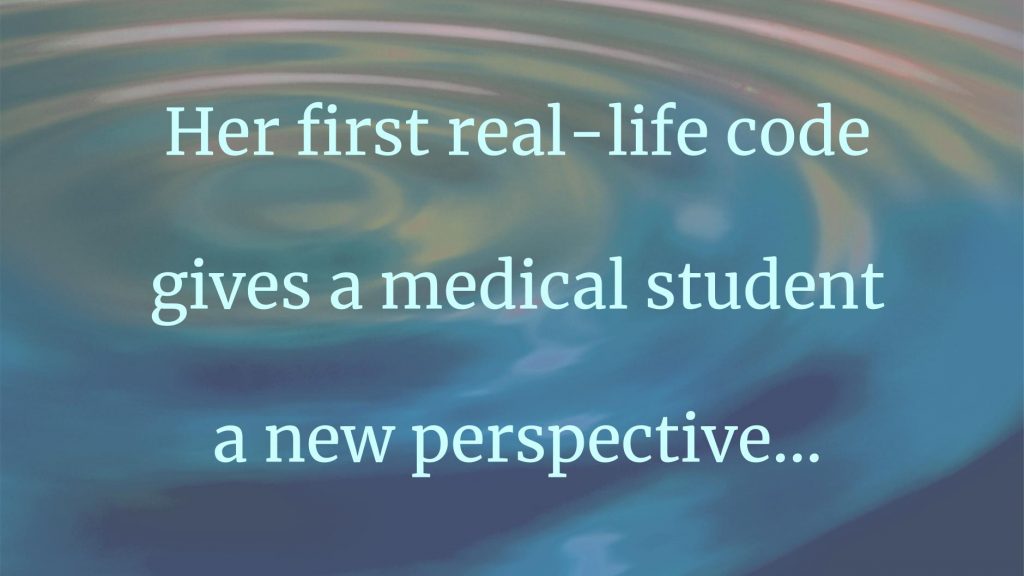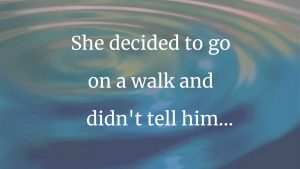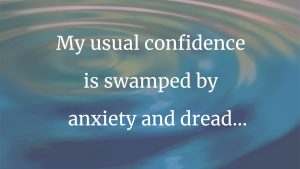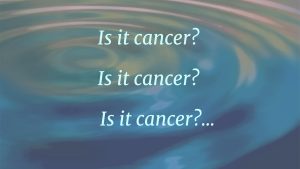“Deeper compressions! Deeper! Make sure you get that recoil!”
I push harder and lift off higher. I’m starting to sweat. My stethoscope is banging around my neck. I should have taken it off, I think. My hair is flying around my face. I should have tied it up. I’m on tiptoe; my legs are cramping. I should have stood on a step stool.
“All right, she’s getting tired. Next!”
Embarrassing…I only lasted through one round of compressions. Other people (taller, more muscular people) are lasting longer. I really need to lift weights. Doing chest compressions is much more physically demanding than I’d thought.
“Okay, stop!” the emergency physician yells at the class of twenty medical students and residents. “Great job, everyone. Now, what could we have improved?”
I look over at the mannequin, who looks a little more deflated than at the beginning.
Sorry, I think. I have a habit of apologizing to inanimate objects.
Only weeks later, I’m on my ICU rotation, rounding on real patients with my team. The ICU is a strange place–full of beeping noises and tubes attaching patients to machines. It’s normal for patients not to respond when spoken to.
One patient seems more alert and stable than the others–at any rate, she’s talking. She’s wearing a face mask and has pulmonary hypertension. She is short; her feet don’t jam against the end of the bed like most patients’ do. Her daughter, maybe eleven years old, looks like a miniature replica of her. Her husband looks young, almost like a younger brother. They sit at the end of her bed, each stroking one of her feet.
Weird, I think. We tell them the treatment plan for the day, then leave to see other patients.
Hours later, Annie, the team’s physician assistant, suddenly materializes.
“The lady with pulmonary hypertension is decompensating,” she says, calmly but urgently.
We start speed-walking towards her room.
“We should run,” Annie says. We started running: This is not a drill. Crash carts literally crash into the room, and more and more staff members pour in. The woman’s daughter and husband are pushed outside, unresisting.
I watch the residents and fellows form a line to do chest compressions.
“Are you a med student?” the pulmonology fellow asks. I nod.
“Well, get in there!” He gives me a slight push.
I dutifully get in line, though I’m shocked: Do they really want a medical student doing this, with someone’s life actually on the line?
Then I think, You’re as prepared as anyone here. You went through that code training.
Recalling that experience, I take off my sweater and my stethoscope. I tie up my hair. I bring over a step stool to stand on. I’m ready.
“Next!”
My turn. My heart beats fast. Sounds become muffled. I stand over the woman. She’s half naked, breasts exposed. Her glasses are askew. Her light brown hair is disheveled.
Being close to death is not pretty. This is raw. This is important. I place my hands in the middle of her chest and push hard.
All the circumstances are right. My stethoscope isn’t banging against my neck. My hair isn’t flying around my face. I’m at the correct height. My compressions are between three and four inches deep as displayed on the monitor, just like that emergency physician taught us. I’m thrilled.
Live! I think to the woman. Live! With each push, I feel more convinced that she will. I look into her face. Wake up, lady! Your family is right outside! I even dare to think about how amazing it might feel if her heart resumed beating underneath my hands….
“Next!”
I lasted much longer this time. Proudly, I step off the stool. The next person comes forward. The noise in the room comes back to full volume.
The lab tech rushes in. “Her blood gas came back! It’s fifteen.”
“Oh, no…that’s not good.”
“It’s over now.”
“Time of death: 2:37.”
No! I think. It can’t be!
But it is. It’s over as quickly as it began. People start stepping away from the woman’s body. Everyone still does their jobs, but with less urgency.
The ICU doctor heads straight for the woman’s family in the hallway. The daughter is crying. The husband is crying, too–yet he still manages to thank the doctor for his help.
I almost cry too, looking at them, but I feel it would be selfish. Who am I, a stranger, to cry when her family has so much more reason?
For a while afterwards, I look back on this moment as the first time I ever did chest compressions on a patient, and the first time I ever saw a patient die. For a medical student, those are important milestones.
Soon, though, I realize what my thoughts should have been: This is the only time this girl is going to see her mother die. This is the last time this man will say goodbye to his wife. This is the moment when he knows that he’ll have to raise his daughter alone–his lovely daughter, who looks exactly like his wife. This is the worst day of their lives.
I try to remember this moment every time I’ve got to rush out of the bathroom because I’m getting paged about a patient, every time I have to skip lunch because there’s a new admission, every time I must wake up at the crack of dawn after crawling into bed only a few hours earlier, delirious from lack of sleep, and go to work.
I try to remind myself that, whatever kind of day I’m having, my patients are having a worse one. Remembering that helps me try to put their pain first and to be compassionate, not resentful. It helps me try to think of how the day has affected their lives, not just how it has affected mine.
Looking back on that day in the ICU, I no longer view it as the day I saw a patient die for the first time. It was the day I saw a daughter lose her mother, and a husband lose his wife. I lost something that day, too–something I’m glad to be rid of: the automatic habit of viewing an interaction with a patient primarily in terms of how it affects me.








8 thoughts on “First Time, Last Time”
Kristin! So happy to see you here on Pulse. Last time Patty and I saw you we were all in the DR at the Haitian frontier doing clinics. I loved your story, so well written. You have a great eye for telling details. I well recall my own experience of seeing someone die for the very first time. You never forget that moment, that day. I look forward to seeing more of your writing. Regards, Lee Kagan
Nice job. As someone who has been at (compressed,inserted central lines, run ABGs, defibrillated, called the code and ended) hundreds of codes, I loved those little details you mention. I’d read anything you write because it’s honest.
Very touching piece! I’ve been practicing medicine for 37 years, and I got a lump in my throat and tears in my eyes as I finished reading it. Thank you.
I loved reading this. A good reminder from an obviously fine doctor of what’s important.
Excellent reminder for us all.
Dr. Nguyen, thank you for your story, and especially for its lesson. Learning that “it’s not about me as the doctor” is one of the more important things we learn as we move forward in our career. But it’s also OK, in my opinion, to acknowledge the newness of some of these lessons as we experience them; we are only human, and there is a learning curve in our socialization as physicians.
Honest, raw…thank you.
Thank for your openness and honesty in your excellent story.